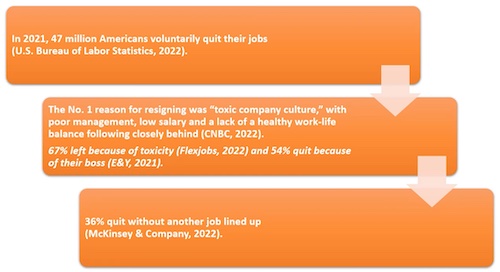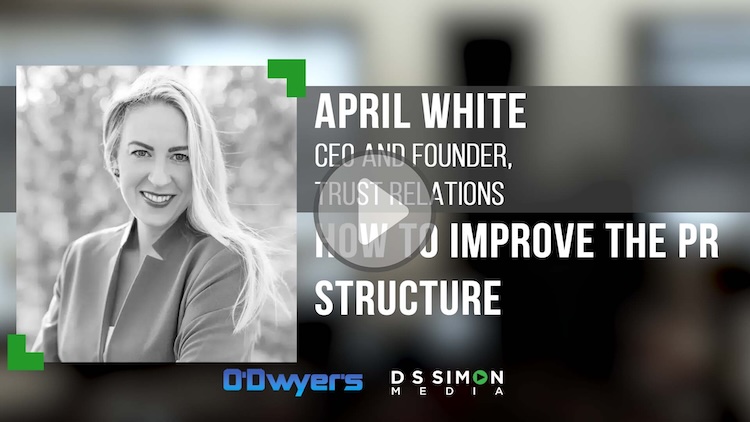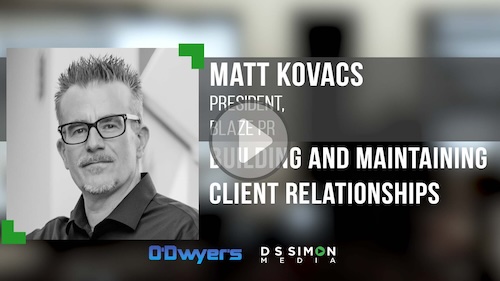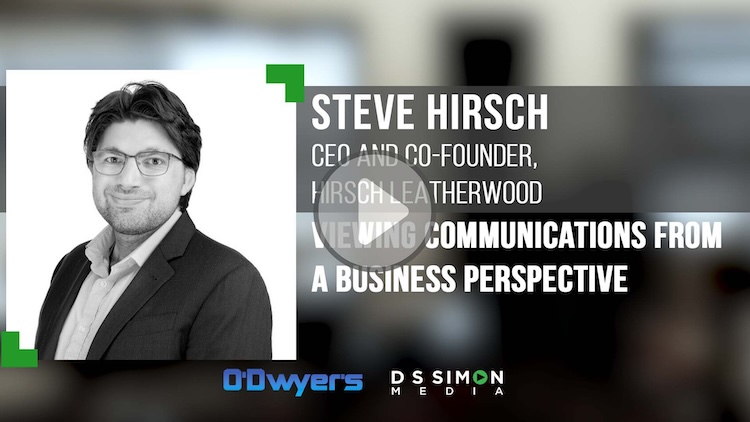 |
| Dr. Kerry O'Grady |
Focus on “The Great Resignation” and “Quiet Quitting” has mostly landed on the employee, but the overwhelmingly common thread is a boss that has created a negative experience, according to Dr. Kerry O’Grady, Faculty Director and Associate Professor of Practice, Georgetown University.
O’Grady stressed that there is a profound difference between the terms boss and leader. A boss is more transactional, often too busy to listen and learn from employees and removed from day-to-day activities. A boss just wants to get things done. A leader, on the other hand, is someone ready to jump in, get their hands dirty and personally connect with employees.
O’Grady shared her thoughts Sep. 20 with more than 200 registered attendees of the second virtual webinar in a new series hosted by O’Dwyer’s and moderated by Researchscape’s Tony Cheevers. The event has sparked conversations on Twitter and LinkedIn with more than 1,000 impressions tallied so far.
“Great leaders keep great people, but bosses perpetuate the great resignation,” O’Grady said.
In 2021, 47 million Americans voluntarily quit their jobs, according to the U.S. Bureau of Labor Statistics.
The number one reason for resigning was toxic company culture, with poor management, low salary and a lack of a healthy work-life balance following closely behind, CNBC reported.
Finally, and most shockingly, 36 percent quit without lining up another job, McKinsey & Company research shows.
“People are leaving their jobs without something else lined up, no safety net, what a risk,” O’Grady lamented.
 |
Change your seat
O’Grady presented the metaphor of changing seats on a train to show how leaders must force themselves to see things from a different perspective in their organizations in order to affect company culture.
“What happens after you’ve been on the train for a while? You know where the café car is, what end of the car has the bathroom, picked up on annoyances from fellow riders, etc. But if you were to move to a different car, you’d have to relearn the logistics of the train and adjust your viewpoint.” O’Grady explained.
“Who do you need to change seats with right now in your organization?” O’Grady asked.
Being a leader has taken a back seat to just achieving goals, O’Grady stressed. In order to change, employees must be treated as more than just cogs in a wheel.
O’Grady recommends:
- listening to day-to-day employee issues
- communicating long-term strategies
- encouraging transparent salary talks
- being open about budgeting and providing honest rationale for decisions
- spreading around leadership roles like leading office meetings
- remembering to actually use new ideas and strategies you request
Workplace empathy
O’Grady noted that leaders must not blame an individual for their personal feelings but adopt a new form of “workplace empathy” that entails an obligation to get to the root of problematic issues.
In most cases employees are part of a symbiotic ecosystem in which a job cannot be done alone, O’Grady explained.
O’Grady advises:
- tossing out individual blame except in most extreme cases
- asking employees questions instead of talking at them
- respecting different ways employees process information
- getting to know your employees as people
- creating an environment for open discussion of difficult topics
- pausing frequently for reactions in conversations
- sharing company information and developments as soon as you can
- acknowledging greatness right away
In the end, people will stay in jobs where they see growth and opportunity and are being treated fairly, O’Grady said.
“Good leaders know the people at the ground level keep the lights on,” Grady concluded.
A recording of the webinar is available where you can also view the slide presentation and transcript.
Next up for the series on Oct. 18th at 2 p.m. EDT is "To Plan or Not to Plan: Strategic Planning in a Dynamic World." Panelists are Monique Waters, Founder at H20 Strategies and Tina Charpentier, Executive VP at Padilla.
Followed by "Leading Through Challenging Times" Nov. 15th @ 3 p.m. EDT. Jean Serra, Founder of V2 Communications, will lead the discussion.
Future topics under consideration are:
- Content Marketing and its intersection with PR
- Mental health and wellness at work
- Crisis communications
Feel free to contact John O'Dwyer at [email protected] if you'd like to suggest a topic, be a panelist or are interested in sponsoring a webinar.










 Have a comment? Send it to
Have a comment? Send it to 
No comments have been submitted for this story yet.